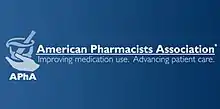American Pharmacists Association
 | |
| Abbreviation | APhA |
|---|---|
| Formation | October 6, 1852[1] |
| Type | Professional Association |
| Headquarters | American Pharmacists Association Building Washington, DC |
Region | United States |
| Fields | Pharmacy |
Membership | More than 62,000[2] |
Key people | Michael Hogue (Immediate Past-President)
Sandra Leal (President) Theresa Tolle (President-elect) Mary Munson Runge (Past-President) |
| Website | http://www.pharmacist.com/ |
Formerly called | American Pharmaceutical Association |

.jpg.webp)
The American Pharmacists Association (APhA, previously known as the American Pharmaceutical Association), founded in 1852, is the first-established professional society of pharmacists in the United States.[3] The association consists of more than 62,000 practicing pharmacists, pharmaceutical scientists, student pharmacists, pharmacy technicians, and others interested in the profession. Nearly all U.S. pharmacy specialty organizations were originally a section or part of this association.
Mary Munson Runge became the first woman and the first African-American elected president of this association in 1979; she was president for two terms, from 1979 to 1981.[4][5][6]
Organization
All members choose one of these three Academies :
- American Pharmacists Association - Academy of Pharmacy Practice and Management (APhA–APPM)
- American Pharmacists Association - Academy of Pharmaceutical Research and Science (APhA–APRS)
- American Pharmacists Association - Academy of Student Pharmacists (APhA–ASP)
The Annual Meeting & Exposition provides a forum for discussion, consensus building, and policy setting for the pharmacy profession. The association's Board of Trustees is responsible for broad direction setting of the; Association;. Policy is developed by the APhA House of Delegates that meets each year at the association's Annual Meeting & Exposition. The House of Delegates has representatives from all major national pharmacy organizations, state pharmacy associations, federal pharmacy and APhA's three academies.
Publications
The Association publishes two peer-reviewed journals:[7]
- The Journal of the American Pharmacists Association, the official peer-reviewed journal of the society publishing articles on pharmacy practice, therapeutics, and health issues.
- The Journal of Pharmaceutical Sciences, a peer-reviewed scientific journal dealing with pharmaceutical science and biotechnology
It also publishes:[7]
- Student Pharmacist, intended for pharmacy students,
- Transitions, an online newsletter
- APhA DrugInfoLine, a website with summaries of current developments and new drugs
- Pharmacy Library, a series of approved textbooks.
See also
- American Institute of Pharmacy Building, the Association's headquarters building in Washington, D.C., listed on the National Register of Historic Places
- Board of Pharmacy Specialties, independent subdivision of the APhA that certifies pharmacists in specialities
- Journal of the American Pharmacists Association, the Association's official journal
- Remington Medal, awarded annually by the APhA
References
- ↑ "History of APhA". American Pharmacists Association. Retrieved 19 April 2016.
- ↑ "Who We Are". American Pharmacists Association. Retrieved 19 April 2016.
- ↑ "About APhA". Archived from the original on September 29, 2008. Retrieved September 2, 2008.
- ↑ Metta Lou Henderson; Dennis B Worthen (8 March 2002). American Women Pharmacists: Contributions to the Profession. CRC Press. pp. 120–. ISBN 978-0-7890-1092-6.
- ↑ admin (2014-01-08). "Mary Munson Runge 1928 ~ 2014". Kappa Epsilon. Retrieved 2019-04-11.
- ↑ "LIttle Known Black History Fact: Mary Munson Runge". Black America Web. Interactive One, LLC. 18 November 2016. Retrieved 7 November 2017.
- 1 2 "APhA publications".